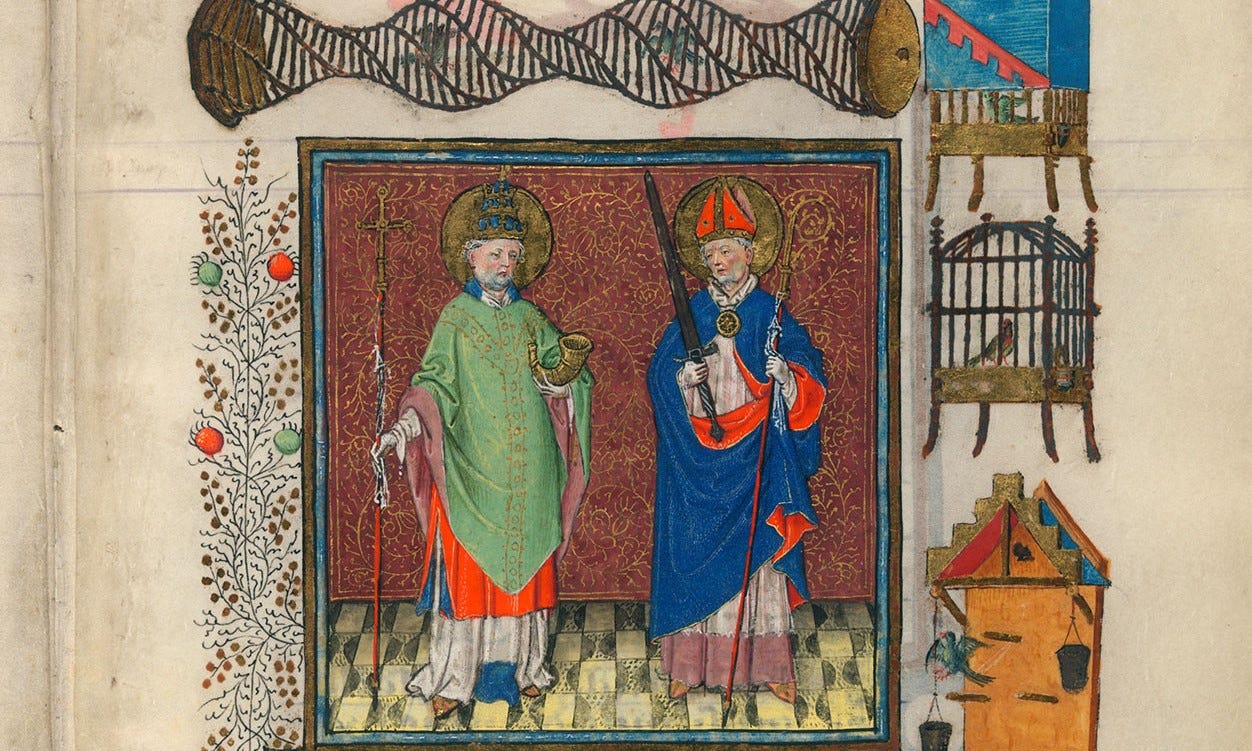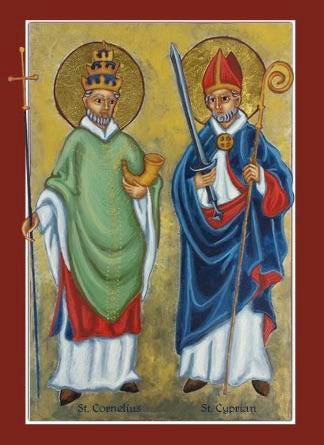The Ultimate Sacrifice: Reflecting on the Feast Day of the Martyrdoms of St. Cornelius and St. Cyprian

United Against Heresy, United in Martyrdom
St. Cornelius, Bishop of Rome from 251 to 253 AD, lived during a turbulent time for the early Catholic Church. The Novatian heresy, which originated with the Roman priest Novatian, claimed that the Church could not offer forgiveness to Christians who had lapsed in their faith under persecution. This was in direct opposition to the Church's teaching on repentance and mercy.
St. Cyprian, Bishop of Carthage from 248 to 258 AD, became a strong ally of Pope Cornelius in countering this heresy. Together, Cornelius and Cyprian taught that the Church had the God-given power to forgive any sin, if the sinner was truly penitent. They offered a path back into the full communion of the Church for those who had renounced the faith under persecution but now sought reconciliation.
Despite their efforts, the Novatian heresy continued to spread. The Roman emperor Gallus exiled Cornelius to modern-day Civitavecchia in 253 AD, where he died a martyr's death soon after. Cyprian was eventually beheaded in Carthage in 258 AD under the persecution of Emperor Valerian.
The martyrdoms of Cornelius and Cyprian prove their unwavering commitment to Christ and His Church. Just as Christ laid down His life out of love for humanity, these holy men embraced martyrdom rather than betray their faith or their flock. Their sacrifices vividly reflect Romans 8:18-39, which speaks of the glory that awaits those who suffer with Christ and are conformed to His death.
Though killed by different emperors and in different lands, the martyrdoms of Cornelius and Cyprian stand together as a powerful testament. Their lives and deaths give us hope that we too may remain steadfast in faith despite life's trials and persecutions. May their examples inspire us to cling to Christ above all else.
We praise you, O God, for the courageous witness of Saints Cornelius and Cyprian, who surrendered their lives rather than compromise their faith. May their martyrdom remind us always of the surpassing worth of loving and serving you. Guide us by their example, that we too may remain faithful to the end. We ask this through Christ our Lord, Amen.
A letter of St Cyprian
A faith that is eager and firm
Cyprian to his brother Cornelius.
My very dear brother, we have heard of the glorious witness given by your courageous faith. On learning of the honor you had won by your witness, we were filled with such joy that we felt ourselves sharers and companions in your praiseworthy achievements. After all, we have the same Church, the same mind, the same unbroken harmony. Why then should a priest not take pride in the praise given to a fellow priest as though it were given to him? What brotherhood fails to rejoice in the happiness of its brothers wherever they are?
Words cannot express how great was the exultation and delight here when we heard of your good fortune and brave deeds: how you stood out as leader of your brothers in their declaration of faith, while the leader’s confession was enhanced as they declared their faith. You led the way to glory, but you gained many companions in that glory; being foremost in your readiness to bear witness on behalf of all, you prevailed on your people to become a single witness. We cannot decide which we ought to praise, your own ready and unshaken faith or the love of your brothers who would not leave you. While the courage of the bishop who thus led the way has been demonstrated, at the same time the unity of the brotherhood who followed has been manifested. Since you have one heart and one voice, it is the Roman Church as a whole that has thus borne witness. Dearest brother, bright and shining is the faith which the blessed Apostle praised in your community. He foresaw in the spirit the praise your courage deserves and the strength that could not be broken; he was heralding the future when he testified to your achievements; his praise of the fathers was a challenge to the sons. Your unity, your strength have become shining examples of these virtues to the rest of the brethren. Divine providence has now prepared us. God’s merciful design has warned us that the day of our own struggle, our own contest, is at hand. By that shared love which binds us close together, we are doing all we can to exhort our congregation, to give ourselves unceasingly to fastings, vigils and prayers in common. These are the heavenly weapons which give us the strength to stand firm and endure; they are the spiritual defenses, the God-given armaments that protect us.
Let us then remember one another, united in mind and heart. Let us pray without ceasing, you for us, we for you; by the love we share we shall thus relieve the strain of these great trials.
The proconsular Acts of the martyrdom of St Cyprian, 258AD
I have no need to deliberate: the issues are clear
On the morning of 14 September a huge crowd gathered at Villa Sexti as the proconsul Galerius Maximus had ordered. The proconsul commanded that Bishop Cyprian be brought to trial before him as he sat in judgement in the court called Sauciolum.
When the bishop appeared the proconsul asked him: ‘Are you Thascius Cyprian?’
The bishop replied: ‘I am.’
‘And have you acted as leader in a community of impious men?’
‘I have.’
‘The sacred emperors have ordered you to sacrifice.’
‘I will not sacrifice.’
‘Consider your position.’
‘Do what is required of you. I have no need to deliberate; the issues are clear.’
Galerius consulted briefly with his advisers and reluctantly pronounced sentence in the following words: ‘You have lived in an irreligious manner for a long time now and have gathered about you a large congregation of criminals and unbelievers. You have shown yourself hostile to the gods of Rome and the rites by which they are worshipped. The pious and sacred emperors Valerian and his son, Gallienus, and the right noble Caesar, Valerian, have been unable to recall you to the practice of the official religion. Furthermore you are the instigator of abominations, a veritable standard-bearer for criminals and as such you have been brought before me. Your death will be an example to those whom you have gathered into your criminal conspiracy. Your blood will uphold the law.’ He then pronounced the following sentence from his wax tablet: ‘It is our decision that Thascius Cyprian be put to death by the sword.’
Bishop Cyprian simply said, ‘Thanks be to God.’
When sentence had been passed the assembled brethren cried out: ‘Let us be beheaded with him!’, and followed him in a huge and tumultuous crowd. Cyprian was brought to the plain of Sextus. There he removed his cloak and kneeling down he humbled himself in prayer to God. He disrobed and gave his dalmatic to the deacons. Clad only in his linen tunic he awaited his executioner.
When the executioner arrived Cyprian told his followers to give him twenty-five gold pieces. His brethren spread before him linen cloths and towels. The blessed Cyprian blindfolded his eyes with his own hands. The presbyter Julian and the subdeacon Julian tied the ends of the handkerchief since he was unable to do so himself. So died blessed Cyprian.
His body was exposed nearby to satisfy the curiosity of the pagans. During the night the body was removed by the light of wax candles and torches, and with prayer and great pomp it was brought for burial to a piece of open ground belonging to the procurator Macrobius Candidianus near the reservoirs on the Mappalian Way. A few days later the proconsul Galerius Maximus died.
The blessed Cyprian suffered martyrdom on 14 September, under the emperors Valerian and Gallienus, but in the reign of our Lord Jesus Christ, to whom is honor and glory for ever. Amen.
Today’s Mass Collect
O God, who gave Saints Cornelius and Cyprian to your people as diligent shepherds and valiant Martyrs, grant that through their intercession we may be strengthened in faith and constancy and spend ourselves without reserve for the unity of the Church.
Through our Lord Jesus Christ, your Son, who lives and reigns with you in the unity of the Holy Spirit, God, for ever and ever.



